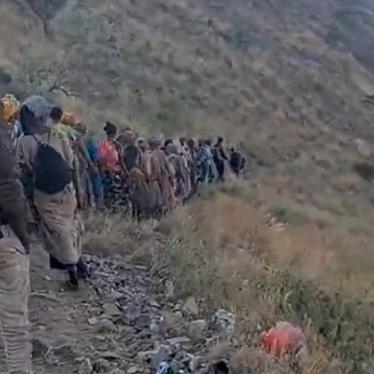(Beirut) – Representatives of two construction companies in Saudi Arabia announced recently that migrant workers will get their long overdue unpaid wages, but gaps in the repayment scheme puts the payments at risk, Human Rights Watch said today.
Saudi authorities should ensure all former workers of these companies receive the full amount they are owed. The authorities should also put in place robust wage protection measures to address the rampant wage theft that migrant workers across the country experience.
“Migrant workers who were relieved after the announcement that they would finally be paid what they are owed want to remain optimistic despite almost a decade of waiting,” said Michael Page, deputy Middle East and North Africa director at Human Rights Watch. “But it’s critically important for the appointed bankruptcy and liquidation trustees, the Saudi authorities, and the migrants’ countries of origin to ensure that these promises are fully carried out.”
In 2016, following a period of low oil prices and an economic downturn in Saudi Arabia, several companies failed to pay hundreds of thousands of migrant workers their wages, leaving them stranded. In late 2023, Saudi Oger’s Liquidation Trustees and Mohammad Al-Mojil Group (MMG)’s Bankruptcy Trustee, the trustees of the two Saudi-based construction companies, who faced such economic challenges and are currently in liquidation and bankruptcy respectively, announced that former employees should register for their payments.
The extent of unpaid wages is enormous. The Executive Court in Riyadh estimated in 2019 that the now-liquidated Saudi Oger owes an estimated SAR 2.6 billion (about US$693 million) in unpaid wages and other benefits to workers. Based on news sources and announcements from the migrants’ countries of origin, at least 21,000 workers just from the Philippines, Nepal, Bangladesh, and Pakistan are owed wages by these two companies.
In January 2024, Human Rights Watch interviewed 27 migrant workers from Bangladesh, India, Nepal, Pakistan, the Philippines, and Senegal who said they were formerly employed by Saudi Oger or MMG. Researchers also reviewed several workers’ salary sheets and checks. The workers said they had worked between 3 and 20 years in Saudi Arabia and were owed as much as SAR 80,000 (about $21,333) by one of the companies, including end-of-service benefits.
Human Rights Watch also wrote to Saudi Oger’s Liquidation Trustees, MMG’s Bankruptcy Trustee, and Saudi Arabia’s Alinma Bank requesting details and status of the repayment schedule, but has yet to receive a response.
Of the 27 migrant workers Human Rights Watch spoke to, two former Saudi Oger employees, including one still living in Saudi Arabia, said they had received checks for back wages and had been able to cash them. Six others said they received checks by mail but could not cash them. Twelve are awaiting further details or checks after registering, and seven could not register due to missing names or claim numbers. At the end of February 2024, Human Rights Watch also followed up with 10 of the 27 workers, but they reported no changes in their registration or payment status.
The cost to workers of employers’ non-payment of wages for extended periods can be catastrophic financially and mentally for them and their families. One migrant worker who worked at Saudi Oger said: “I always get tense about my wages because I have lost my sweat and blood to earn every penny. Now I am affected with high blood pressure … I am living a very hard life. I had to take bank loans to run my family and for our [medical] treatment. If I get that money, I can repay the loans. Otherwise, I will be destroyed.”
Workers also vividly recalled having to rely on their embassies or Saudi authorities in 2016 for food and repatriation support when their wages weren’t paid. Others used their savings or had help from family back home, including loans. A few workers said that they had been trapped in Saudi Arabia as they were neither paid nor able to leave the country because the company had not renewed their residency permit.
The workers said they relied on social media and each other over the years to stay updated about the status of plans to pay back their wages. Some continued to fight for their wages even after returning home. A Filipino worker said: “In the Philippines, my colleagues rallied … [they] went to Mendiola Street [a street in Manila often used for protests], stood there and were interviewed by the media, and dispersed peacefully. We spoke with the Overseas Workers Welfare Administration, Department of Migrant Workers, etc...”
The issue of unpaid wages for thousands of migrant workers had been central to the Philippines’ diplomatic discussions with Saudi authorities, who provided assurances that the workers would be paid, as per media sources. On February 6, Philippine authorities announced that 843 checks out of 1104 that have been issued cleared and were credited to the migrant workers, amounting to a total of around 868.7 million pesos (about US$15.5 million). However, over 9,000 more workers are still waiting for their dues.
Thousands of Pakistani migrant workers have not been able to register their details correctly, authorities and people interviewed said. Three workers active on social media said they have been helping their peers register for their claims. One said: “We help those who connect with us on social media, but we do not know how many remaining workers are not aware of these schemes.”
The son of a former MMG employee said his father, who is not technologically savvy, found out through a local radio news program in Nepal about the call for registration and asked his son to get him registered. The authorities should maximize their outreach efforts to ensure that all eligible workers are informed about the program and can easily register their details.
One Nepali worker who had lost hope about ever receiving his money said he was pleasantly surprised to see an announcement from his country’s embassy about repayment. He said that he had registered and is waiting for the check, and that “with that money, I will do business in my village.”
Another worker from Pakistan in a similar position said: “Once I receive this money, inshallah [God willing], I plan to either start a business, arrange my sister's marriage, build a new house, or find a job. This money will relieve the problems and tensions I've faced.” An Indian worker, while relieved to cash his check, said: “Why should I be happy? This is our right.”
Workers who received their checks are also facing practical issues cashing them. A Bangladeshi worker said he desperately made expensive international calls multiple times to Alinma Bank, a Saudi-based bank from which former Saudi Oger workers received checks. When he finally received his check, no bank in Bangladesh was willing to cash it. One worker said that a local Bangladeshi bank had accepted their check, but that it would take them several weeks to receive their money. Philippine workers Human Rights Watch spoke to said they have deposited their checks but that their local banks would, as one put it, “wait until Alinma bank will give this money into our savings.”
The seven workers interviewed whose names were not included in the original claimants list or given claim numbers said they are owed thousands of dollars. They have received no clarity about why they were excluded. One said of officials at his embassy: “All they told me is that only names of lists provided to them [by the MMG Bankruptcy Trustees] are eligible for claims.”
In social media posts calling on former Oger and MMG employees to submit their claims, many Saudi returnees from other companies with similar grievances have questioned whether there will be similar calls from their former employers. Ongoing research by Human Rights Watch has also documented extensive cases of wage theft by employers, with many recent workers returning home without what is owed to them. This wage theft remains widespread, Human Rights Watch found, despite Saudi authorities announcing various labor reform initiatives.
“Workers who migrate to seek better opportunities should not be returning home empty-handed from Saudi Arabia,” Page said. “This is a major opportunity to remedy a continuing injustice, and it is critical for the Saudi authorities to get the details right and ensure that all workers’ owed wages are compensated, especially ahead of mega-events that will rely entirely on migrant workers.”









